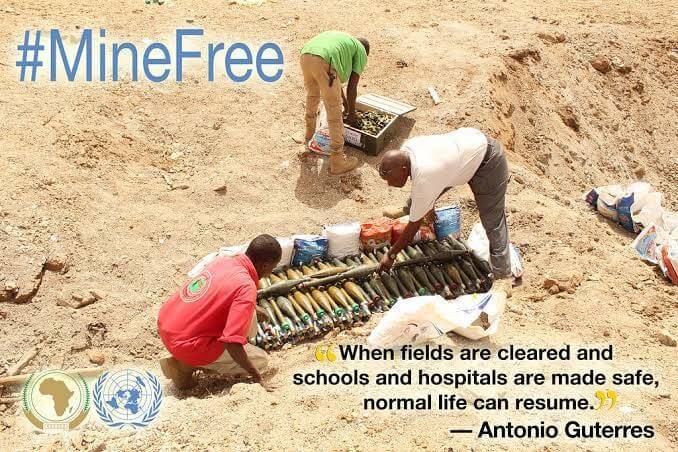International Day for Mine Awareness and Assistance in Mine Action

International Day for Mine Awareness and Assistance in Mine Action is celebrated every April 4.
“I know of no great men except those who have rendered great service to the human race,” said Voltaire, a French Enlightenment writer, historian and philosopher.
Each year, the 4th of April marks the International Day for Mine Awareness and Assistance in Mine Action. It was first observed on 4 April, 2006.
This day highlights the important work being done to rid the world of Landmines, Explosive Remnants of War (ERW) and the increasing use of Improvised Explosive Devices (IEDs).
On 8 December 2005, the General Assembly established the International Day for Mine Awareness and Assistance in Mine Action. Since then, this day is observed on 4 April of each year. With resolution A/RES/60/97, the General Assembly called on all Member States to “foster the establishment and development of national mine-action capacities in countries where mines and explosive remnants of war constitute a serious threat to safety, health and lives of the civilian population, or an impediment to social and economic development at the national and local levels.”
For over 20 years, the work of the United Nations Mine Action Service (UNMAS) has been driven by the needs of affected people and tailored to the threat of explosive hazards faced by civilians, peacekeepers and humanitarians.
UNMAS works to save lives, facilitate deployment of UN missions and the delivery of humanitarian assistance, protect civilians, support the voluntary return of the internally displaced and refugees, enable humanitarian and recovery activities, and advocate for international humanitarian and human rights law.
The mine action community around the world, led by the United Nations Mine Action Service (UNMAS), starts rolling out activities a week in advance. Every year, UNMAS organizes a multimedia exhibition at the United Nations Headquarters in New York to spread awareness about the threats caused by mines, explosive remnants of war and improvised explosive devices.
Activities for these awareness-raising events include photo exhibits, press conferences, film screenings, educational displays, and community chats. Public events may include public statements from land mine survivors, mine action theatre performances, and mine risk education demonstrations.
In addition, each year the day is characterized by a theme specific to that particular year. For instance:
- Awareness Day and Assistance in Mine Action 2019 was observed with the theme ‘United Nations Promotes SDGs–Safe Ground–Safe Home.’ These highlighted the fact that “All people have the right to live in security, and not fear their next step” and called for mine action, which “clears paths and creates safe ground on which homes can be built or rebuilt” and “changes mindsets so that people know how to protect themselves.” Further, the United Nations has launched “Safe Ground,” a new strategy and campaign to “ensure that no one, no State, and no war zone is left behind”.
- The theme for the year 2020 was “Together for Mine Action.”
- For 2021, the theme was Perseverance, Partnership, and Progress. This year, the UN had laid focus to advance the work so that new partnerships can be formed.
Furthermore, the day aims to raise awareness about landmines and progress toward their eradication.
“Mine action” refers to a range of efforts to clear landmines and explosive remnants of war and to mark and fence off dangerous areas. It also includes assisting victims, teaching people how to remain safe in a mine-affected environment, advocating for universal participation in international treaties related to landmines, explosive remnants of war and their victims, and destroying landmines stockpiled by governments and non-state armed groups.
Creating a world free from deadly weapons is an important objective for the United Nations. Together with government and civil society groups, it created the Mine Ban Treaty in 1997, which prohibits the use, stockpiling, production and transfer of anti-personnel mines and provides for their destruction.
Signed by over 162 countries, the Treaty has brought about a dramatic reduction in the use of landmines. But there is still a long way to go. Mines are still present in over 60 countries, threatening the lives of millions of people and preventing the land they contaminate from being used, for agriculture and housing, for example.
This Day serves to raise awareness of the ongoing threat posed by mines, calls on those states that have not yet signed the Treaty to do so, and mobilize resources to help the countries affected.
In 2018, UNMAS convened, coordinated and led the drafting of the United Nations Mine Action Strategy 2019-2023. Two of the most significant aspects of the Strategy are that it represents an accountability framework for the United Nations system and introduces a Theory of Change for the United Nations' engagement in Mine Action.
Radio Veritas Asia (RVA), a media platform of the Catholic Church, aims to share Christ. RVA started in 1969 as a continental Catholic radio station to serve Asian countries in their respective local language, thus earning the tag “the Voice of Asian Christianity.” Responding to the emerging context, RVA embraced media platforms to connect with the global Asian audience via its 21 language websites and various social media platforms.











